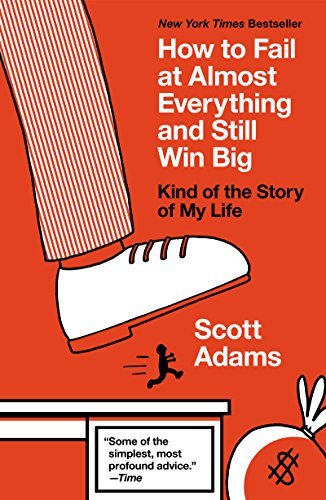How to Fail at Almost Everything and Still Win Big Summary
<1 min read ⌚

The author, Scott Adams, probably has had more failures than anyone you’ve ever met. How did he get out of this cycle of negative experiences and become the creator of Dilbert, one of the most famous comics in the world?
In this book, he shares his story and explains how his past failure experiences helped him achieve success. Conventional wisdom says that we need goals and that if we reach them, then we will succeed. But that is not true.
“How to Fail at Almost Everything and Still Win Big Summary”
Many times we fail even after following all these procedures. So do we genuinely achieve success? Discover reading this book!

Forget Objectives And Goals, Use Systems
There are several problems in the reasoning that says you need to set goals for success.
First, when we set goals, we have very high expectations, and they can be difficult to achieve. That means working for that goal will probably be an unpleasant task, which will give you a sense of failure until that goal is achieved.
Think about your New Year’s resolutions. Did you stick to any of them? If like the majority, you have not kept your resolution, this is not a surprise. Most likely, you have defined unrealistic tasks.
Secondly, goals need to have an endpoint. What happens when you reach them? You can set another goal, but you will then feel inadequate again. Similarly, goals produce a cycle that is mostly negative and unsatisfactory because the goals are unrealistic.
So why not take a less specific, more comprehensive and continuous approach? That means using systems-based thinking.
The systems consist of a simple idea that can be applied in your daily life to improve your situation in the long run.
Let’s say you want to expand your small business.
A system could be used to take advantage of every networking opportunity so that you regularly meet potential investors. You will feel good gaining contacts and more motivated knowing that this system will improve your chances of success.
 When Adams decided to create a desirable product easy to reproduce, he had perceived a general system. Every time a new idea failed, he did not see it as a single defeat.
When Adams decided to create a desirable product easy to reproduce, he had perceived a general system. Every time a new idea failed, he did not see it as a single defeat.
Instead, he saw the benefits of each “defeat”: new knowledge, insights, contacts, and the elimination of bad ideas.
He felt good about his efforts because he was applying his systems, designed as an effective long-term plan, guiding him to a better place.
What makes the systems approach valuable is the effect it will have on your perception of failure and your overall posture. You will feel you are on a positive path simply by following your system.
In A System, You Learn About Failures
When something does not go the way you planned, it seems natural to feel disappointed and to doubt your abilities. But this mentality comes from a goal-driven approach.
You did not reach your target, you did not get that job, so you failed. It is a simple conclusion.
But as we have seen, individual failures can be seen in a different way when you use the systems approach. Within the context of a personal system, failure has new attributes.
It becomes a key and a necessary trait. The failure process is part of a successful system, and your system takes care of your guidance so that you have a greater chance of finding success in the long run.
Failure has always been beneficial in some ways because it teaches you a few things. You acquire the knowledge you did not have before, perhaps a new skill or a new contact that might be useful.
Most importantly you have altered your perception of failure within the systems approach because that is what will give you the incentive you need to be energized. And when you’re excited, your performance is best in all areas.
When Adams didn’t get a job after an interview for an inexperienced position, he learned that being automatically supportive was an important factor for success.
He realized he couldn’t have gotten the job because someone else fit the specifications better, so he looked for possibilities in which his skills were more applicable. And this has become one of Adams’s systems.
Dilbert (a comic book character) was the result of his quest for a combination of abilities, which gave him an immediate advantage over others.
Some knowledge of the corporate world, drawing skills, and the ability to write satirically. His initial failure to get the job allowed him to achieve his success.
What a person can see as a failure in the short term, you should see it as a learning opportunity, a tool and a necessary part of your system. In the long run, this system will help you to achieve a superior position to succeed.
By looking at failure this way, you will feel much better about your accomplishments, and as a result, you will feel more motivated to try your new endeavors.
Passion Does Not Always Lead To Success
There is a widespread misconception that following your passion will lead you to success. Ask any successful person in your area – from sport to business – how they got there, and they are likely to cite passion as one of the reasons.
However, this shared history hides a hard truth. You may feel incredibly passionate about your project or idea, and yet it may fail. This enthusiasm for projects is likely to disappear as well.
Success usually induces passion, but passion is not necessarily equal to success.
Adams was passionate about the idea when he started a partnership to open a restaurant. Excited at the restaurant’s initial popularity, his passion increased, and he opened a second business.
But when the company began to decline, his levels of enthusiasm fell, and so did profits. In the end, he had to close both restaurants.
Compare this experience to Adams’ beginning when he created Dilbert’s drawings.
This process is what he describes as “one of his many schemes to get rich.”
Although Adams has always been interested in drawing, he only became passionate about his drawing after Dilbert gained popularity. When Dilbert gained strength, Adam’s passion for comics also grew stronger, which made him draw more.
You are likely to be more in love with things that you do very well.
Therefore, you must try new things (and fail) until you discover something that you can do well. The same concept applies to new ideas. Keep trying until you develop one that is well received.
Then you will gain an incredible vital energy, to know that your effort is producing results.
These are the initial factors needed to achieve success. And as a result, your passion is likely to increase – thus increasing your energy levels and productivity.
You need to find something that works. Be it a single strong skill, a combination of skills, or an idea that has positive reception.
No matter whether you feel passionate about the idea in the beginning or not, you need to feel energized by those skills or ideas. Passion almost always comes with success, but the reverse is not necessarily true.
Develop Different Skills
Thanks to popular success concepts, it is no surprise that many believe that you need to have an extraordinary talent to achieve great feats.
Or, it is also believed, that you need to keep working with your unique passion until you reach your goal.
The media highlights these stories: the unlikely boy who struggled to become an athlete and won an Olympic gold medal; the founder of a startup that focused on creating nutritional products, until one day he launched a famous brand of smoothies.
These stories hide reality. Sticking to a particular skill will not necessarily yield results.
Of course, when you increase your number of skills, you increase your chances of achieving success in the long run.
Acquiring various skills helps you work as a system, to get you in a better position. So when an opportunity comes along, you will be ready to take advantage of it.
You do not have to be great at every skill. Just increasing your skills so that you have some knowledge already helps you gain assets.
The simplest way to think about it is to think about applying for a job. The more requirements you can fill, the greater your chances.
You can be an excellent researcher and writer, and have a passion for social work, but if you don’t know anything about marketing processes, you probably don’t have good chances.
So it’s worth accepting an opportunity to acquire additional skills and knowledge. The more you get involved in the learning process, the easier it will be for you to understand similar issues.
Also, believing in this process means that you will feel more motivated to learn, and will be closer to success.
And of course, failure is part of that process. As you fail, you will learn from your mistakes, which is a part of your system when making decisions about what skills and knowledge you should acquire.
Instead of persistently focusing on a particular skill, take every opportunity to increase your skills base, no matter how disinterested you may be in the beginning.
A variety of skills at a mediocre level may seem much more impressive than a single exceptional skill.
How to Fail at Almost Everything and Still Win Big
That, by the way, increases your options. The more opportunities available, the greater your chances of finding out what works for you.
Discover What Gives You Energy And Invest Time In It
Energy is a vital order to be motivated and to maximize efficiency in everything you do.
Increasing your energy should be part of your system. It may seem obvious, but it’s likely there are certain ways you have not considered before to improve your energy (and therefore improve your general attitude about the things you do).
One way to increase your energy is to establish an activity that you can do in your life and that you can improve through practice.
It can be a game, sport, or a hobby. No matter what it is, as long as you can improve over time and enjoy that feeling of satisfaction and success.
This positive feeling increases your energy but also becomes a habit. Knowing that you are capable of achieving something is very motivating. And this can improve your mood, so you feel better about your overall abilities.
Consequently, you will want to enjoy this feeling of success in other areas of your life.
So find something you enjoy doing, and you can improve your performance over time.
This process will get you accustomed to the benefits of improving your performance on something, and will also give you a sense of how much time you need to work to see good results. These lessons will be useful when applied in a work context.
The energized feeling that you will gain from knowing that you are capable of improving in any activity will increase your confidence and make you want to do more. You will be increasingly encouraged to try different things.
This attitude helps you acquire future skills and knowledge and also improve your possibilities. The feeling of progression in an area is beneficial, and it will make you feel excellent.
Imagine Your Future With Optimism
How you feel about where you’re headed has a great impact on your ability to perform and on your motivation. Unfortunately, if you feel negative about your current possibilities or your career, your motivation may dampen.
The benefits of being optimistic may seem self-explanatory, but if optimism is not something that comes naturally to you, consider how it can work in your favor.
As you realize your situation has a lot to do with where you see yourself going in the future. If you can see a positive future, you will feel more energized and more motivated in your current achievements.
You can guarantee that your future will be this way if you use your imagination to create a vision of success for your work.
It does not matter if things don’t go the way you expect them. What is important is that you have used this vision to increase your energy levels and try something different by learning new things in the process.
Adams uses this strategy for every new project he launches. He is perfectly aware of the possibilities of failure, but his vision for the potential of each project ensures that he has enough energy and motivation to make things work.
This attitude ensures he will improve his skills and gain new insights from that experience.
This way, failure becomes irrelevant. The use of Adam’s imagination becomes part of an efficient system to improve his likelihood of reaching a better position when opportunities for success arise.
Instead of letting your external situation affect your mentality, try to get around the situation so that your attitude can direct your position. You need to imagine a positive future to be more focused, have more humor, and have enough energy in the present.
You will be more motivated and more likely to see your projects to fruition. That is a guarantee that you will learn and increase your skills, and also make some useful contacts while you’re at it.
Like this summary? We’d Like to invite you to download our free 12 min app, for more amazing summaries and audiobooks.
“How to Fail at Almost Everything and Still Win Big” Quotes
I made a list of skills in which I think every adult should gain a working knowledge. I wouldn't expect you to become a master of any, but mastery isn't necessary. Luck has a good chance of finding you if you become merely good in most of… Share on X If you want success, figure out the price, then pay it. It sounds trivial and obvious, but if you unpack the idea it has extraordinary power. Share on X Happiness has more to do with where you are heading than where you are. Share on X Avoid career traps such as pursuing jobs that require you to sell your limited supply of time while preparing you for nothing better. Share on X Priorities are the things you need to get right so the things you love can thrive. Share on XFinal Notes:
By following some logical and practical steps, and by changing your way of perceiving success and failure, you can create a more efficient model to control your likelihood of success. By adopting a systems-based strategy, you change your perception of your overall progress.
Rather than being disappointed that you did not achieve your goal, you feel you are working to improve your position in the long run.
Systems require you to view failure as a valuable learning opportunity. Failure may be inevitable, but it is useful.
Pro tip: Could you be inspired by Scott Adams’ stories of failure (followed by success!)? So be sure to check out his success: Dilbert cartoons.
Emir is the Head of Marketing at 12min. In his spare time, he loves to meditate and play soccer.







